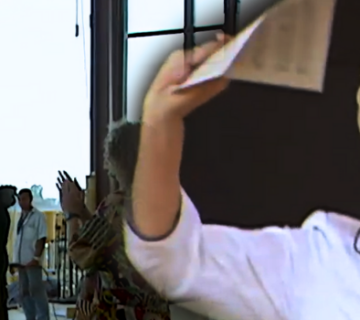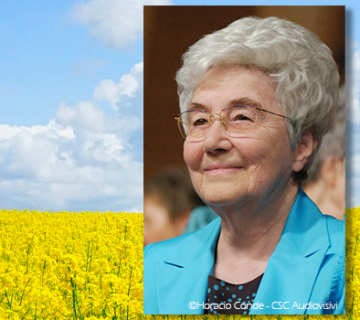In meeting Ignatius in Manresa, Theresa in Avila, John of the Cross in Segovia, I found “giants” of sanctity who gloriously reached the goal by walking along personal, individual spiritual ways.
The extraordinary episodes in the lives of these elected souls, the holy words they said, the divine words they heard, the various environments in which they expressed one attitude or another, still fragrant with the burning love of God in their souls, had a strong, noteworthy impact on me. They unearth an insatiable desire: that of deepening, of developing to the utmost our personal relationship with God.
I felt the urgency, the need to consider once again the sacred moments that God’s will for us has reserved for this purpose, and the beauty of carrying out with increased commitment the appointments of prayers in the different moments of our daily life.
They are for us the “clothes” we put on, the premise for being able to go out then to love our brothers and sisters.
Yes, our clothes! But what clothes are we speaking of here?
They are the golden “clothes” of our union with God. They are and must be gold, gold, gold. And they can become a gold mine if we grow by going out to love our brothers and sisters for God.
I’ve begun to live in this way, trying to perfect, almost to refine or polish those moments. Do you know what the first result was?
Perhaps because “to everyone who has, more will be given” (Mt. 25:29), the effect was the impetus to do even better the next day, always better, almost as if we never do things well enough.
But the strongest effect, I would say the most extraordinary effect of this commitment has been, paradoxically, to see with greater clarity and precision and to feel attracted towards those words of Scripture, in the New Testament, which are most suited to the characteristic aspect of our spirituality, which is above all communitarian, and which enable us to live it out. Like “May they all be one” (Jn 17:21) – we need brothers or sisters to live this; like “Love one another as I have loved you” (Jn 15:12) – we need brothers or sisters; like “Above all, let your love for one another be intense” (1 Pt 4:8). They are words which concern not only me but also my brothers and sisters, and while they must be lived out after having put on the above-mentioned “clothes”, they must also be lived beforehand – in a sense, but undoubtedly – due to a divine interlacing, so that our lives as Christians may be completely fulfilled.
Is it not necessary to leave our gift at the altar – one of our practices – in order to be reconciled with our brother or sister if this is necessary?
But there is more. I also felt attracted towards other words of Scripture which are important for us and which undoubtedly help us to reach that necessary Christian self-denial, self-annihilation, so admired in the Spanish saints. For us, though, this annihilation is not pursued directly, but by giving visibility to our works for the glory of God. Words like “You are the light of the world; (…) your light must shine before others, that they may see your good deeds and glorify your heavenly Father” (Mt 5:14-16). “Glory to your heavenly Father”, not to us; once again self-denial.
I felt attracted by still others words which ask that we show the world not so much the renouncements that the Gospel asks of all Christians, but the wealth and beauty of the gifts that God gives to us because he is our Father, like the words concerning the “hundredfold” which the Gospel speaks of, in relation to those who leave everything (this is the basic poverty, detachment); or the words: “Learn from the way the wild flowers grow. They do not work or spin. But I tell you that not even Solomon in all his splendour was clothed like one of them. If God so clothes the grass of the field, which grows today and is thrown into the oven tomorrow, will he not much more provide for you” (Mt 6:28-30). Only if we have faith in Him, only if we renounce thinking about it too much ourselves: this is annihilation.
It would seem that these aspects can show a new countenance of the Church, that of the risen Lord.
Later we’ll have chance of going deep into these aspects of Christian life. But we need a spiritual rebirth that is summed up in this formula: “Gold plus gold equals a gold mine.” That is: gold in union with God, in our prayers, in going in depth with this; plus gold: loving, loving the others, loving from morning till night, loving always. If we collect love in union with God and we collect love by loving our neighbors, our heart will become a gold mine, so that we can pour this gold on the world.


 Italiano
Italiano Español
Español Français
Français Português
Português


